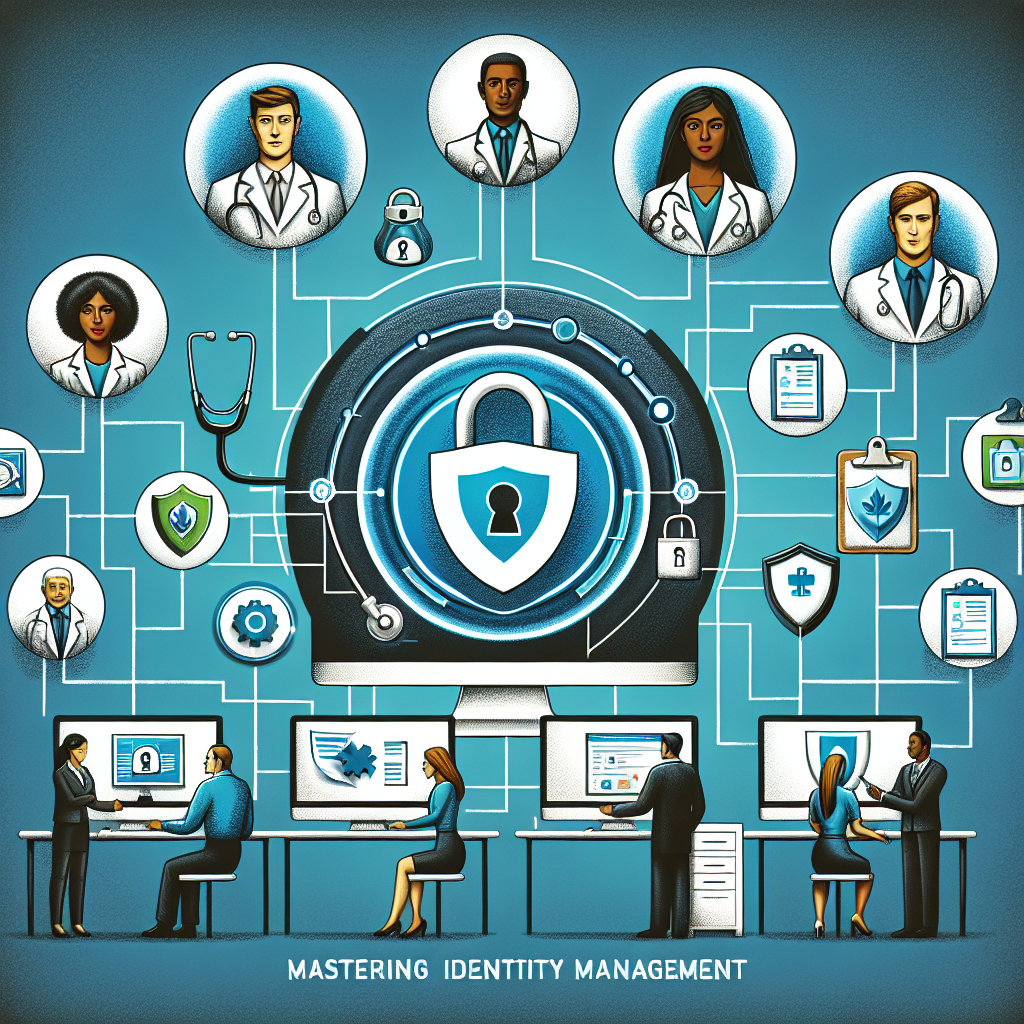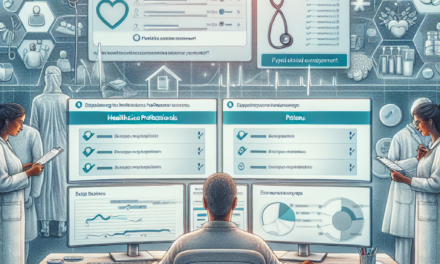Mastering Identity Management: A Key to Healthcare Security

In the rapidly evolving landscape of healthcare, the importance of robust identity management cannot be overstated. As healthcare organizations increasingly rely on digital systems to manage patient information, the need for secure and efficient identity management systems becomes paramount. This article delves into the intricacies of identity management in healthcare, exploring its significance, challenges, and best practices. By understanding and mastering identity management, healthcare providers can enhance security, improve patient care, and ensure compliance with regulatory standards.
The Importance of Identity Management in Healthcare
Identity management in healthcare is crucial for safeguarding sensitive patient information and ensuring that only authorized personnel have access to it. With the rise of electronic health records (EHRs) and telemedicine, the potential for data breaches has increased, making identity management a top priority for healthcare organizations.
Protecting Patient Data
One of the primary reasons identity management is vital in healthcare is the protection of patient data. Healthcare organizations handle vast amounts of sensitive information, including personal identification details, medical histories, and financial data. A breach of this information can have severe consequences, including identity theft, financial loss, and damage to an organization’s reputation.
According to a report by the Ponemon Institute, the average cost of a healthcare data breach is $7.13 million, the highest among all industries. This statistic underscores the financial implications of inadequate identity management and highlights the need for robust systems to protect patient data.
Ensuring Compliance with Regulations
Healthcare organizations must comply with various regulations designed to protect patient information, such as the Health Insurance Portability and Accountability Act (HIPAA) in the United States. These regulations mandate strict controls over who can access patient data and how it is used.
Effective identity management systems help healthcare providers comply with these regulations by ensuring that only authorized personnel can access sensitive information. This not only protects patient privacy but also shields organizations from potential legal and financial penalties associated with non-compliance.
Enhancing Patient Care
Identity management also plays a crucial role in enhancing patient care. By ensuring that healthcare providers have access to accurate and up-to-date patient information, identity management systems enable more informed decision-making and better patient outcomes.
For example, in emergency situations, having immediate access to a patient’s medical history can be life-saving. Identity management systems ensure that this information is readily available to authorized personnel, facilitating timely and effective treatment.
Streamlining Operations
Efficient identity management can streamline healthcare operations by reducing administrative burdens and improving workflow efficiency. By automating identity verification processes, healthcare organizations can minimize manual errors and free up staff to focus on patient care.
Moreover, identity management systems can integrate with other healthcare technologies, such as EHRs and telemedicine platforms, to provide a seamless experience for both patients and providers. This integration enhances operational efficiency and improves the overall quality of care.
Building Trust with Patients
Trust is a fundamental component of the patient-provider relationship. Patients need to feel confident that their personal information is secure and that their privacy is respected. Effective identity management systems help build this trust by demonstrating a commitment to data security and privacy.
By prioritizing identity management, healthcare organizations can reassure patients that their information is in safe hands, fostering stronger relationships and encouraging patient engagement.
Challenges in Implementing Identity Management Systems
While the benefits of identity management in healthcare are clear, implementing these systems is not without its challenges. Healthcare organizations must navigate a complex landscape of technological, organizational, and regulatory hurdles to establish effective identity management systems.
Technological Complexity
One of the primary challenges in implementing identity management systems is the technological complexity involved. Healthcare organizations often rely on a diverse array of systems and applications, each with its own identity management requirements.
Integrating these systems into a cohesive identity management framework can be a daunting task, requiring significant technical expertise and resources. Additionally, healthcare organizations must ensure that their identity management systems are scalable and adaptable to accommodate future technological advancements.
Balancing Security and Usability
Another challenge in identity management is striking the right balance between security and usability. While robust security measures are essential for protecting patient data, overly complex authentication processes can hinder usability and frustrate users.
Healthcare organizations must design identity management systems that provide strong security without compromising user experience. This requires careful consideration of factors such as authentication methods, user interfaces, and access controls.
Managing Diverse User Groups
Healthcare organizations must manage a diverse range of user groups, including doctors, nurses, administrative staff, and patients. Each of these groups has different access needs and security requirements, adding complexity to identity management efforts.
Effective identity management systems must accommodate these diverse user groups while ensuring that access controls are appropriately tailored to each group’s specific needs. This requires a nuanced understanding of the roles and responsibilities of different users within the organization.
Ensuring Interoperability
Interoperability is a critical consideration in identity management, particularly in the context of healthcare. Healthcare organizations often need to share patient information with external entities, such as other healthcare providers, insurance companies, and government agencies.
Ensuring that identity management systems are interoperable with external systems is essential for facilitating secure data exchange and collaboration. This requires adherence to industry standards and protocols, as well as ongoing collaboration with external partners.
Addressing Privacy Concerns
Privacy concerns are a significant challenge in identity management, particularly in the healthcare sector. Patients are increasingly aware of the importance of data privacy and are concerned about how their information is used and shared.
Healthcare organizations must address these concerns by implementing robust privacy controls and ensuring transparency in their data handling practices. This includes providing patients with clear information about how their data is used and obtaining informed consent for data sharing.
Best Practices for Identity Management in Healthcare
To overcome the challenges associated with identity management, healthcare organizations can adopt a range of best practices. These practices are designed to enhance security, improve efficiency, and ensure compliance with regulatory standards.
Implementing Multi-Factor Authentication
Multi-factor authentication (MFA) is a critical component of effective identity management. By requiring users to provide multiple forms of verification, MFA significantly enhances security and reduces the risk of unauthorized access.
Healthcare organizations should implement MFA across all systems and applications, ensuring that users are required to provide additional verification beyond just a password. This can include factors such as biometric authentication, security tokens, or one-time passcodes.
Regularly Reviewing Access Controls
Access controls are a fundamental aspect of identity management, determining who can access specific information and resources. Healthcare organizations should regularly review and update their access controls to ensure that they remain aligned with organizational needs and security requirements.
This includes conducting regular audits of user access rights, revoking access for users who no longer require it, and implementing role-based access controls to ensure that users only have access to the information necessary for their roles.
Investing in Identity Management Solutions
Investing in robust identity management solutions is essential for healthcare organizations looking to enhance security and efficiency. These solutions provide a centralized platform for managing user identities, access controls, and authentication processes.
When selecting an identity management solution, healthcare organizations should consider factors such as scalability, interoperability, and ease of integration with existing systems. Additionally, organizations should prioritize solutions that offer advanced security features, such as MFA and encryption.
Providing Ongoing Training and Education
Effective identity management requires ongoing training and education for all users. Healthcare organizations should provide regular training sessions to ensure that users understand the importance of identity management and are familiar with best practices for maintaining security.
This includes training on topics such as password management, recognizing phishing attempts, and understanding the organization’s access control policies. By fostering a culture of security awareness, healthcare organizations can reduce the risk of data breaches and enhance overall security.
Collaborating with Industry Partners
Collaboration with industry partners is essential for staying abreast of the latest developments in identity management and ensuring interoperability with external systems. Healthcare organizations should actively engage with industry groups, participate in conferences, and collaborate with technology vendors to stay informed about emerging trends and best practices.
By working together with industry partners, healthcare organizations can share knowledge, resources, and expertise, ultimately enhancing their identity management efforts and improving overall security.
Case Studies: Successful Identity Management in Healthcare
To illustrate the impact of effective identity management in healthcare, we will explore several case studies of organizations that have successfully implemented identity management systems. These case studies highlight the benefits of robust identity management and provide valuable insights for other healthcare providers.
Case Study 1: Mayo Clinic
The Mayo Clinic, a leading healthcare provider in the United States, has implemented a comprehensive identity management system to enhance security and improve patient care. The system includes multi-factor authentication, role-based access controls, and a centralized identity management platform.
By implementing these measures, the Mayo Clinic has significantly reduced the risk of unauthorized access to patient information and improved the efficiency of its operations. The organization has also enhanced its compliance with regulatory standards, ensuring that patient data is protected at all times.
Case Study 2: Cleveland Clinic
The Cleveland Clinic, another prominent healthcare provider, has invested in advanced identity management solutions to enhance security and streamline operations. The organization’s identity management system includes biometric authentication, automated access controls, and real-time monitoring of user activity.
These measures have enabled the Cleveland Clinic to improve the security of its patient data, reduce administrative burdens, and enhance the overall quality of care. The organization has also strengthened its relationships with patients by demonstrating a commitment to data privacy and security.
Case Study 3: Kaiser Permanente
Kaiser Permanente, one of the largest healthcare providers in the United States, has implemented a robust identity management system to protect patient information and ensure compliance with regulatory standards. The system includes multi-factor authentication, encryption, and regular audits of user access rights.
By adopting these measures, Kaiser Permanente has enhanced the security of its patient data and improved the efficiency of its operations. The organization has also built trust with patients by prioritizing data privacy and demonstrating a commitment to protecting sensitive information.
Case Study 4: NHS Digital
NHS Digital, the digital arm of the National Health Service in the United Kingdom, has implemented a comprehensive identity management system to enhance security and improve patient care. The system includes role-based access controls, automated identity verification processes, and real-time monitoring of user activity.
These measures have enabled NHS Digital to improve the security of its patient data, reduce administrative burdens, and enhance the overall quality of care. The organization has also strengthened its relationships with patients by demonstrating a commitment to data privacy and security.
Case Study 5: Singapore Health Services
Singapore Health Services, a leading healthcare provider in Singapore, has invested in advanced identity management solutions to enhance security and streamline operations. The organization’s identity management system includes biometric authentication, automated access controls, and real-time monitoring of user activity.
These measures have enabled Singapore Health Services to improve the security of its patient data, reduce administrative burdens, and enhance the overall quality of care. The organization has also built trust with patients by prioritizing data privacy and demonstrating a commitment to protecting sensitive information.
The Future of Identity Management in Healthcare
As technology continues to evolve, the future of identity management in healthcare holds exciting possibilities. Emerging technologies and trends are set to transform the way healthcare organizations manage identities and protect patient information.
Biometric Authentication
Biometric authentication is poised to play a significant role in the future of identity management in healthcare. By using unique biological characteristics, such as fingerprints or facial recognition, biometric authentication offers a highly secure and convenient method of verifying user identities.
As biometric technology becomes more advanced and accessible, healthcare organizations are likely to increasingly adopt biometric authentication as a standard practice. This will enhance security and streamline authentication processes, improving both user experience and data protection.
Blockchain Technology
Blockchain technology has the potential to revolutionize identity management in healthcare by providing a secure and transparent method of managing identities and sharing information. By using a decentralized ledger, blockchain can enhance data security and integrity, reducing the risk of unauthorized access and data breaches.
Healthcare organizations are beginning to explore the use of blockchain for identity management, with pilot projects and initiatives underway. As the technology matures, it is likely to become an integral part of identity management strategies in the healthcare sector.
Artificial Intelligence and Machine Learning
Artificial intelligence (AI) and machine learning are set to play a significant role in the future of identity management in healthcare. These technologies can be used to analyze user behavior, detect anomalies, and identify potential security threats in real-time.
By leveraging AI and machine learning, healthcare organizations can enhance their identity management efforts, improving security and efficiency. These technologies can also be used to automate identity verification processes, reducing administrative burdens and improving user experience.
Interoperability and Data Sharing
Interoperability and data sharing will continue to be critical considerations in the future of identity management in healthcare. As healthcare organizations increasingly collaborate with external partners, the need for secure and efficient data exchange will become more pronounced.
Emerging standards and protocols are set to enhance interoperability and facilitate secure data sharing, enabling healthcare organizations to collaborate more effectively and improve patient care. By prioritizing interoperability, healthcare organizations can ensure that their identity management systems are future-proof and adaptable to changing needs.
Privacy and Data Protection
Privacy and data protection will remain top priorities in the future of identity management in healthcare. As patients become more aware of the importance of data privacy, healthcare organizations must continue to prioritize robust privacy controls and transparent data handling practices.
Emerging technologies, such as privacy-enhancing cryptography and secure multi-party computation, offer new possibilities for protecting patient information and ensuring privacy. By staying abreast of these developments, healthcare organizations can enhance their identity management efforts and build trust with patients.
Conclusion
Mastering identity management is a key component of healthcare security, offering numerous benefits for both healthcare organizations and patients. By implementing robust identity management systems, healthcare providers can protect sensitive patient information, ensure compliance with regulatory standards, and enhance patient care.
While the challenges associated with identity management are significant, adopting best practices and leveraging emerging technologies can help healthcare organizations overcome these hurdles. By prioritizing identity management, healthcare providers can build trust with patients, improve operational efficiency, and ultimately deliver better care.
As the healthcare landscape continues to evolve, the importance of identity management will only grow. By staying informed about emerging trends and technologies, healthcare organizations can ensure that their identity management efforts remain effective and adaptable to changing needs.





